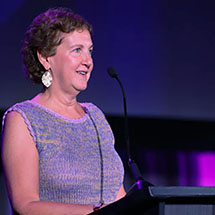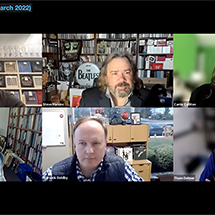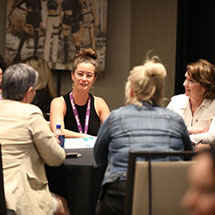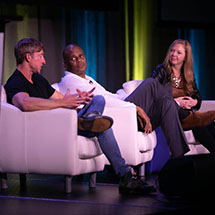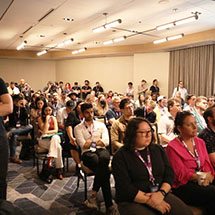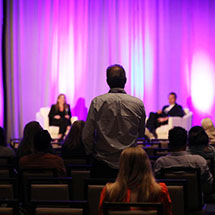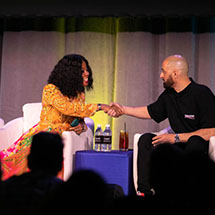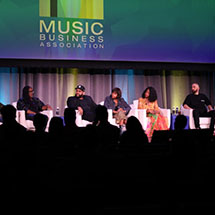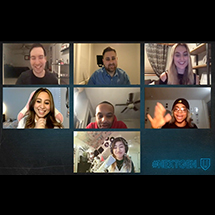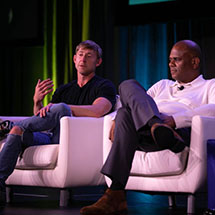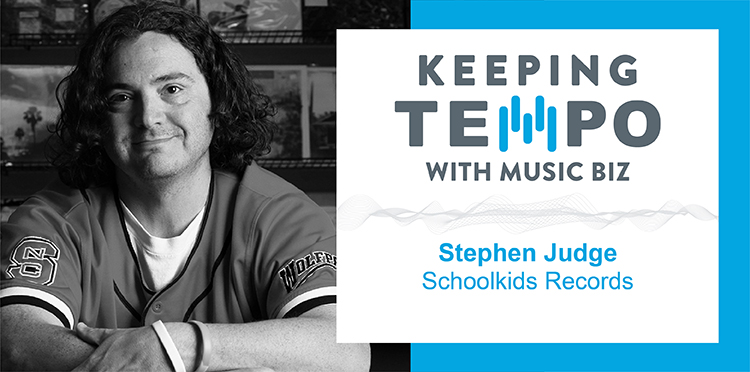
[Keeping Tempo With Music Biz] — How Indie Records Stores Are Weathering the Storm: Interview with Schoolkids Records’ Stephen Judge

A month or so in, and the ongoing COVID-19 health crisis has already made a lasting impact on not just our industry, but on the ways the international community does business as a whole. As a segment of the industry largely reliant on foot traffic, the indie record store community is working tirelessly to ensure they can keep their doors open and serve their local communities with the music they so desperately look for to help cope in times of crisis. Thankfully, there is relief coming in the form of financial support from both the public and private sectors, not to mention the renewed interest in vinyl, cassettes and other physical music products that is driving online sales for indie retailers. Music Biz was lucky to sit down with Stephen Judge of Schoolkids Records to discuss this and much more!
MB: The most glaring topic on everyone’s radar right now is the effects of the COVID-19 health crisis on not only the music industry, but also on normal day-to-day life. How are you and the Schoolkids team holding up amidst this crisis?
SJ: Yeah, that’s certainly a loaded and fluid question isn’t it? It literally changes daily, and I think I have experienced just about every emotion possible trying to adjust to everything. For the last three weeks my response to this question has been, “uh (with a hesitation) not good, this could be devastating to us and our business,” worrying not just about my business, but for record stores all across the country. While that is still the case, I am starting to settle into this “new life” as we call it and the response that seems to fit is “doing well, under the circumstances.”
I mean, I have my health and so does my family, so I can’t ask for much more right now than that. We had to let go of our entire staff back on March 18th because there is no way we would have been able to cover payroll and the situation was just getting worse every day, so we have been living off online sales ever since. Luckily, we have invested a lot of time, money and energy into our online system over the last several years and that is literally saving us right now. Don’t get me wrong, it’s not making up for the doors being open to the public in any way, shape or form, but I have a lot of friends who own bars, music venues, restaurants and I consider myself lucky to even have inventory to sell. So it’s growing, but it’s not sustainable long-term. We will just have to see where we are at when we get to the end of this crisis.
I am certainly concerned about the debt we will accrue from rent and overhead as this drags out. That could be devastating to our stores but I know we are not alone and we’re just taking it one day at a time.
Personally, I am doing ok. I am generally a very social person and I am used to constant interaction with people every single day, even if I am not in the store. So that has been a bit odd and my body and mind are trying to adjust to long amounts of time being alone. I have my cat and she has been great company. My mom is well into her 80s and in great health, but I obviously worry about that as well. All considered, we’re doing well personally and as good as we can be as a business.
MB: In what ways have you been able to adapt Schoolkids’ business to meet both government regulations and consumer needs for new music and merch?
SJ: As mentioned previously, we’re completely relying on online sales at the moment. We have a robust automated system and are not only selling on our own website (schoolkidsrecords.com), but also through other third party sites such as Amazon, eBay and Discogs — these have all been a life saver. I am going into the store every day and packing orders, which have at least doubled if not tripled. We’re very appreciative that we have the ability to sell even with our doors closed.
I also have a label and we have four releases scheduled for Record Store Day which have already been paid for. So I understand what labels are going through right now as it’s a massive hit for us to take cash flow-wise as we wait and see how that all turns out in the long run. The timing of anything like this is never ideal, but this could have been worse. It could have hit two weeks before RSD when the product was already shipped and created even more chaos, so I appreciate that we were able to react quickly to this and put everything on hold before more damage was done. But it must be a tough time for small indie labels right now who were participating in RSD. I know it is for me, so it’s a double-whammy.
MB: What resources have you been able to access as part of the relief efforts to help your business during this trying period?
SJ: Nothing yet, but we have applied for the SBA loans and expect to hear something soon, hopefully in the next few days. I have tried some other routes, but some of the websites were crashing and by the time I was able to get the system to work, many of the loans were no longer accepting applications. We were never even given a chance to apply. There are rumblings going on that is about to change and more money is going to be pumped into the system to help here, which I think will be critical.
I think everyone knows that this is not going to be enough to keep our doors open; more has to happen to help small businesses. I am part of the Coalition of Independent Music Stores (CIMS) and sit on the board of directors — we’re having bi-weekly meetings about this and trading info and advice to help each other out. In fact, last week we had an SBA loan expert who joined our board call to help us with questions. It’s all very confusing, and websites keep crashing. It’s obvious no one was prepared for this on any level, so we’re doing the best we can to get information. No matter what, more will have to be done by our government to help small businesses. Even under current circumstances, and the longer this drags out, the more that becomes a problem. Pretty much everything rides on how the government reacts here — they have a chance to show small businesses how much they understand and care about us, so we’ll see.
I don’t have a lot of confidence there but I know there are a lot of people fighting for us and we can only hope we get the same respect, if not more than the large corporations who can absorb these hits. If not we’re going to wake up to a completely different world when this is all over and have to question our values as a country and community to make sure something like this never happens again. I want there to be incentive for future generations to start their own businesses and for Schoolkids Records to continue long after I am gone. But if we can’t trust our government to be there at our most desperate time, then that’s not going to encourage folks to take the risk and, as a culture and community, our lives will be much less enriched. I believe in people over government and that we will prevail, but it’s going to be a long rough road to get there.
Adding to this, being a Business Management and Accounting double-major from NC State with a minor in Economics, I have a lot of concerns about what is going to happen after pumping this much cash into our economy, but we built this monster and only have ourselves to blame. I hope this makes us think more in the future about our priorities and what we value the most.
MB: This crisis comes at what was a very ideal time for those selling physical music product — the RIAA’s end-of-year report for 2019 showed that despite streaming driving growth in the U.S. recorded music business for the fourth consecutive year, revenue from vinyl records grew 19% to its highest rate in more than 30 years. How would you say this has translated to both foot traffic and customer interest in physical music products in your store?
SJ: Watching the growth of the vinyl format over the last 12 or so years has been one of the most exciting moments in my career. It literally has saved record stores and also inspired a new generation of entrepreneurs to open shops, and that is very exciting. As a result, it has helped foot traffic dramatically and also customer interest, bringing people back to appreciate the format, record stores and physical establishments in general. Every single day, I have a conversation with someone about vinyl — either someone who is new to the format or a seasoned veteran who hasn’t thought about buying music in years. It has brought new people in and brought people back to us, both appreciating what we do.
MB: How has the growing demand and sales numbers for vinyl — and more novelty formats like cassettes — impacted your outlook on the physical music market going forward?
SJ: It’s everything. Just to add some perspective, I actually left physical retail in 2002 (I was a manager/buyer at Schoolkids) and left to join Redeye Distribution and Yep Roc Records. I was there for seven years and grew from the Sales and Marketing Department to the company General Manager. One of the reasons I left retail was because I saw the writing on the wall and knew it was time to leave. I wanted to expand my experience and I knew retail stores’ days were numbered — it was very bleak. By my seventh year at Redeye, I was signing off on five to 10 new mom-and-pop indie stores every month who were selling nothing by vinyl only. I saw this as an opportunity. My former boss at Schoolkids had no interest in reinventing the wheel and investing back into vinyl again, so I actually bought the store in 2012 as I saw the wave coming. It saved Schoolkids and many stores around the world. So, the outlook has of course been positive, coming from the ashes of death to where we are now is remarkable, but we still have a lot of work to do. It has made an impact but we need to continue to expand and diversify to remain relevant. This is why I have a bar in my stores and have a stage for in-stores — we need to be all-encompassing.
MB: There’s an obvious convenience and cost-effective edge that subscription based music streaming offers to consumers, but what do you think is causing the resurgence of interest in decades-old physical music formats?
SJ: Possibly. I think there are a lot of factors. There are a lot of cliches like, “What is old is new again.” The music business is cyclical, every generation is different and no generation listens to the same music or consumes it in the same way as the generation prior. But it does repeat and manifest itself in different ways and through different experiences. I strongly believe one of the reasons why vinyl has come back is because with digital music, you take the human element out of sharing an experience with each other that cannot be replaced by a physical item. Vinyl is sexy and has so much focus on the artwork and mechanics that go into the production of it all (liner notes, etc). It also creates a completely different warm, encompassing feeling that feels a room.
There has always been two elements to music consumption and sales: one is convenience and mobility, and the second is sharing it or enjoying it by oneself. The CD was the first viable format that created both of those experiences when CD players became available in all cars. Diversity and choice are important to people. You can’t download touch, love or companionship… some of the love languages that can only come with face-to-face, physical contact. In that way, music is no different. Of course, nostalgia plays a part in all of this, but anyone under the age of 40 never really got to experience vinyl as their main format and they are excited about its return.
Audio quality plays into this as well. When you listen to streaming music or music through earbuds, you are not getting the full stereophonic experience — that matters. We instinctively know the difference in good and bad food and how it makes us feel. I’m not saying streaming is bad, but even if we don’t notice it right away, we know the difference. I always say that the moment a younger kid who has always listened to music on a computer, phone or through earbuds hears Pink Floyd’s Dark Side Of The Moon on vinyl, they are changed, especially if they already know the music intimately.
Let me give you an example: I have a close relationship with the country of Ireland. I worked with artists there for years.I lived in Dublin and have dual residency. I love Guinness — it’s the lifeblood of the country. I always ask people, “Do you like Guinness?” If they say, “Yes!” I say, “Have you been to Ireland yet?” If they say “No,” I respond, “You have never actually had Guinness, go to Ireland… you are going to freak out when you have it there.” If they reply, “No, I don’t really like it that much,” I respond, “Have you ever been to Ireland?” If they say “No,” I reply with, “You have never actually had Guinness before, go to Ireland and you will feel differently.” If anyone ever says “Yes” to visiting Ireland, then I look at them and say “You know what I’m talking about, don’t you?” I have never met anyone who has ever been to Ireland and still not liked Guinness. I am sure they exist, but the experience of it is much different, no question. Those who don’t are not your target audience anyway. Music is the same way, and vinyl creates a similar experience for my ears that a pint in Dublin City creates for my taste buds.
MB: A lot has been said about the symbiotic relationship between music streaming and purchasing physical music and merch. Can you speak on that; have you heard from consumers, “I found this on my streaming service, and I had to own a copy?”
SJ: Oh yeah for sure. I have even heard that going back to the days of Napster, before music downloads were available commercially. I remember in the year 2000 once, being at the store on a Tuesday, and the new Superdrag record was out. This was a time where we were really struggling as a retailer, sales were down and the only format was the CD. Around lunchtime that day, two high school kids came into the store to buy the new CD and I only had one copy in stock because I really didn’t feel like there would be much demand. They had been big at one point but it had certainly tailed off. High school kids were not their demographic — their fans were well into their upper 20s and 30s at this point. I was amazed and noticed that they both specifically came into the store to buy that CD because they walked right to the bin card. I had already sold that one copy and think maybe one other person had asked about it before they came in. I was amazed and said, “how do you guys know about Superdrag?” They said, “From Napster; the new record is awesome,” And I said, “yes it is, that’s awesome to hear.”
I realized then, this can help. Twenty years later, has it had a huge impact? That’s hard to say. Can it have more? Absolutely. I feel like a huge opportunity has been lost here — it took the industry so long just to figure this technology out and we had limitations back then (everything was still running on dial-up in those days, if you’ll remember). But I see people walking around the store all of the time, with their phones to their ears listening to records as they browse, checking out new music to see if it’s something they may consider buying, so that access helps. We also have tablets in our stores and an app where you can stream music by just scanning the barcode, so it’s a part of what we do, but more certainly can be done. The streaming services should be working closer with the stores. That hasn’t really happened yet, but consumers are using the tool.
MB: And to that point, do you see music streaming as a future driver of growth for physical music? Or do you think the appeal of owning a copy of a record stands on its own merits for consumers?
SJ: It can be, but I think there needs to be a more symbiotic relationship between both formats. There is so much money being generated in streaming these days, and it can be put to good use. From an industry standpoint, the gross money/benefit coming in from physical sales far outweighs the streaming revenue in regards to keeping the infrastructure in place, all the way down to the artists. If we want this to survive, we have to find ways to come together so everybody wins. Otherwise in the current structure, artists stand to lose the most and not be able to make a living on their talents, and future generations of artists will not see the music business as a viable option for a career. There is a lot at stake here. The consumers want it, we need to give them more and better options and do everything we can to help the artists who are often left out of the discussion. Their health and their stability is the foundation, record stores are the nucleus of that foundation. You lose that and the building falls down.
It’s like what we are dealing with right now with COVID-19, understanding that the service industry, independent retailers, bartenders, restaurants are all the foundation of our communities and our economy. Years ago with the financial crisis of 2008, we bailed out the banks because they were “too big to fail.” Until we understand that the collective of those businesses are just as important, we are just ignoring the obvious foundation of everything. That should be promoted as “too big to fail” and right now, I think this is at the forefront of our minds because we’ve been forced to deal with it. Let’s hope our leaders make the right decisions here and understand how this all works. Trickle down economics doesn’t work, we all know this. If we lose the foundation we will all crumble, plain and simple. It’s black and white but people are so focused on looking ahead, on the top they fail to see what is right in front of their face. That reality is slapping everyone in the face right now. I have been saying for years that a seismic change is coming, this could be it.
MB: Focusing on just the near future, Record Store Day 2020 is coming up (rescheduled to June 20 amid the COVID-19 outbreak). Given the recent struggles with physical music distribution, how do you feel about meeting demand for the limited-edition products that are up for grabs?
SJ: I feel better about it, a lot of people have worked really hard to fix things and put bandaids on this dilemma. There are a lot of huge problems still, but thankfully a lot of third parties have come in to salvage this situation. That creates a whole lot of issues down the line — price being one of them, but also quantity. Record Store Day gets bigger every year and prior to the outbreak and change of date, we had already placed our orders and agreed this could be the biggest year ever in our 46 years in business. The demand is there, supply is a problem and will be for the foreseeable future but thankfully we have options. We have to fix this in the future or we will turn people off with limited accessibility and they also will not be able to afford their passions.
MB: We last wrote about the Direct Shot situation just before the Holiday 2019 selling season. Since then, have there been any significant steps towards alleviating the current stresses on the supply chain for physical music?
SJ: Yes, but mostly by the third party distributors. There has been a massive amount of labels changing distribution which has its pros and cons. We still have a lot of problems and a long way to go. We have had to work three or four times harder to get products in our stores and also have had to pay more as well. It’s still a huge problem, but it’s a new reality we’re all faced with and adapting to as best we can. For now, I am trying to avoid buying right from Direct Shot as much as I can — it’s too risky to deal with those supply chain issues.
MB: When we last spoke to members of the indie retail community, consumer reaction was mostly frustration, given their removal from the behind-the-scenes workings of what was happening. Has that changed at all, and do you find your customers more understanding now that more time has passed?
SJ: I feel it’s the same, but some people think it’s worse. It’s a new reality and we have to figure out how to keep those things going despite the challenges. I feel like this and now the massive challenge of the COVID-19 virus is going to force us into new realities on how we can make more happen with less resources. I don’t have all of the answers to this, but I do have confidence in a lot of my colleagues. I am proud to be a part of the CIMS Coalition and the Music Business Association. All of the experience at the table here has to yield results. If the consumer is frustrated, we are not doing our jobs properly. That’s why we are frustrated, because our job is to serve our customers and community, not frustrate them. I always said that one of the reasons why Napster was so popular when it came out was not just because of its accessibility and because it was free. It was because we were not serving the public and demand properly. People were frustrated, distribution and the airwaves were limited and shrinking, so they took control of the situation themselves. It’s about demand. We need to master the supply or we frustrate them and they move on to something else or take the power and control.
MB: You’re a seasoned veteran of our Annual Conference in Nashville, Music Biz 2020 (now taking place August 16-19, 2020). What brings you back year after year?
SJ: The networking with people from all aspects of the business. I love seeing long time colleagues, but also the new generation coming in. It’s critical to our growth and future that we have a meeting place for ideas, all of the things we’re talking about here happen in this environment. It’s one thing to do it with telecommunications, but another when you are face to face. This industry is built upon relationships, and as far as building new ones, Music Biz is like the Super Bowl.
MB: What are you most looking forward to from this year’s Conference?
SJ: Honestly, just getting inspired by the vibe that is always there every year from the people in attendance. This business can feel so isolating and you can often feel like you are overwhelmed and on your own, When I go to the conference, I realize, “Wait, there are so many people in this business.here is no way it’s going down the tubes. It’s bright, creative, inspiring and has a bright future.” We often need those reminders and I love seeing new people come in and have interest, whether it’s at a panel or just in general. It’s a complicated business in a complicated time — we need to stick together. I look forward to continuing to discuss the current state of the industry and figure out all of these constant challenges we have. This year is the most important conference ever, especially with the COVID-19 virus. It’s going to be needed emotionally for so many people who have been in this business for decades.
MB: For those unfamiliar with our event, what would you say the Music Biz Conference offers specifically to support independent music retailers?
SJ: Face-to-face meetings with all of the distributors and labels are invaluable. All of the decision makers are there. Being in front of them and being able to voice your thoughts is invaluable. Email is a great tool, but you cannot replace face to face. When someone sees you are still there and not going away, they have to deal with you. We’re still here!
MB: What advice would you give to other folks in the indie retail space who are attending our event for the first time, or who are looking to make the most of their four days in Music City?
SJ: Go to the panels and network as much as possible. Go out to the evening events — just go up to people and introduce yourself. Don’t be afraid to speak up. A lot of the real work happens away from the formal meetings and panels. You have to participate — you get out of it what you put into it. Being there is step one. We all have name tags. Find folks. We’re all in this together and now more than ever need creative minds to come together and for people to meet, congregate, hear from those in the field and talk. Every day I hear an incredible idea that I pass up the line or down into my stores. That comes from people who are proactive, you have to do that to survive and Music Biz gives you that platform. Jump in head-first and ride the wave. Don’t just stand on the beach and watch the others. We don’t bite. Like a mosh pit, we help people up and now you are part of the clan but you have to step in.
Music Biz has assembled a running list of relief resources available to businesses and professionals from all segments of the industry, including specific info for indie record stores. Click here to access it.
Check out the list of limited-edition items that will be available this Record Store Day, taking place Saturday, June 20. You can read past “Keeping Tempo ” articles via the portal linked here. And, stay tuned for more insightful discussions from our members and partners from across the industry!

